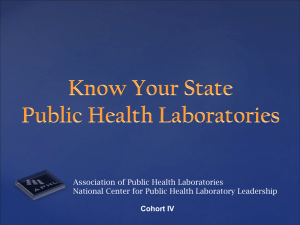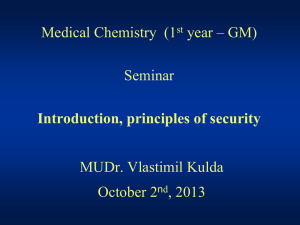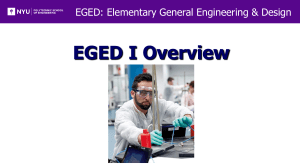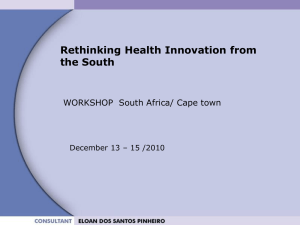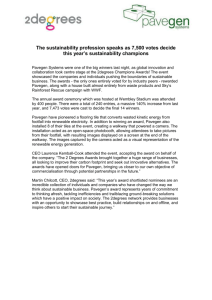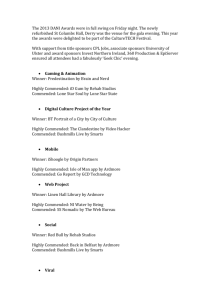Laboratory Energy Analysis and Footprinting (LEAF) - S-Lab
advertisement
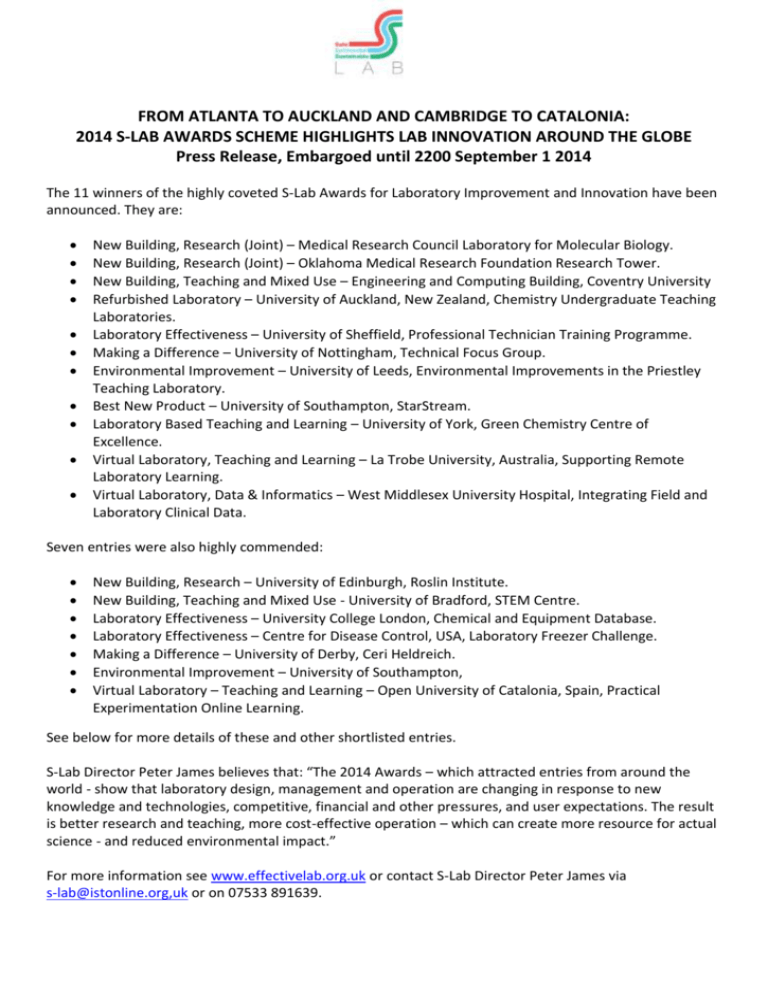
FROM ATLANTA TO AUCKLAND AND CAMBRIDGE TO CATALONIA: 2014 S-LAB AWARDS SCHEME HIGHLIGHTS LAB INNOVATION AROUND THE GLOBE Press Release, Embargoed until 2200 September 1 2014 The 11 winners of the highly coveted S-Lab Awards for Laboratory Improvement and Innovation have been announced. They are: New Building, Research (Joint) – Medical Research Council Laboratory for Molecular Biology. New Building, Research (Joint) – Oklahoma Medical Research Foundation Research Tower. New Building, Teaching and Mixed Use – Engineering and Computing Building, Coventry University Refurbished Laboratory – University of Auckland, New Zealand, Chemistry Undergraduate Teaching Laboratories. Laboratory Effectiveness – University of Sheffield, Professional Technician Training Programme. Making a Difference – University of Nottingham, Technical Focus Group. Environmental Improvement – University of Leeds, Environmental Improvements in the Priestley Teaching Laboratory. Best New Product – University of Southampton, StarStream. Laboratory Based Teaching and Learning – University of York, Green Chemistry Centre of Excellence. Virtual Laboratory, Teaching and Learning – La Trobe University, Australia, Supporting Remote Laboratory Learning. Virtual Laboratory, Data & Informatics – West Middlesex University Hospital, Integrating Field and Laboratory Clinical Data. Seven entries were also highly commended: New Building, Research – University of Edinburgh, Roslin Institute. New Building, Teaching and Mixed Use - University of Bradford, STEM Centre. Laboratory Effectiveness – University College London, Chemical and Equipment Database. Laboratory Effectiveness – Centre for Disease Control, USA, Laboratory Freezer Challenge. Making a Difference – University of Derby, Ceri Heldreich. Environmental Improvement – University of Southampton, Virtual Laboratory – Teaching and Learning – Open University of Catalonia, Spain, Practical Experimentation Online Learning. See below for more details of these and other shortlisted entries. S-Lab Director Peter James believes that: “The 2014 Awards – which attracted entries from around the world - show that laboratory design, management and operation are changing in response to new knowledge and technologies, competitive, financial and other pressures, and user expectations. The result is better research and teaching, more cost-effective operation – which can create more resource for actual science - and reduced environmental impact.” For more information see www.effectivelab.org.uk or contact S-Lab Director Peter James via s-lab@istonline.org,uk or on 07533 891639. ORGANISATIONS INVOLVED IN JUDGING Association of University Directors of Estates (AUDE) BRE Global Environmental Association for Universities and Colleges (EAUC) Higher Education Academy (HEA) Higher Education Funding Council for England (HEFCE) Institute of Occupational Safety and Health (IOSH) Institute of Science and Technology (IST) Institute of Cancer Research (ICR) JISC London Higher National Science Learning Centre (NSLC) National Union of Students (NUS) Research Councils UK (RCUK) Royal Society of Chemistry (RSC) Science Council Scottish Funding Council (SFC) Southern Universities Purchasing Consortium (SUPC) University Biology Managers Association (UBMA) ABOUT THE S-LAB AWARDS The entries covered a range of topics, including best practice design of new and refurbished lab facilities, the importance of technical support, application of lean production principles to lab practice, better chemical and sample management, sharing of equipment, environmental improvement actions, more effective use of freezers, and the growing impact of IT within both research and teaching. The Awards are supported by many leading professional and higher education bodies. They were presented at a prestigious ceremony preceding the Supporting World Class Science conference at King’s College, London on September 2-3. This will have presentations from many of the 58 shortlisted entries. It provides a unique forum for science managers, estates and facilities, technical support, specialist services, suppliers and others to hear about the lab innovations and to network with a wider range of people than they normally experience. ABOUT S-LAB S-Lab is a response to the need to create more effective laboratories arising from financial, customer, user, regulatory and other pressures. It has been mainly funded by the Higher Education Funding Council for England (HEFCE) and has its centre of gravity in universities. However, it now has growing involvement by commercial and public sector laboratories. S-Lab outputs include assessment tools, benchmarking, best practice dissemination, networking and other activities. Its conference and workshops provide a unique opportunity for different laboratory stakeholders to learn from each other, and to engage in crossfunctional and strategic thinking about their activities. For more information see the S-Lab section of www.goodcampus.org. FULL AWARDS SHORTLIST FOR 2014 The shortlist is grouped into 10 categories – New Laboratories (Research); New Laboratories (Mixed Use and Teaching); Refurbished Laboratories; Laboratory Effectiveness; Laboratory Environmental Impact; Virtual Laboratory – Data and Informatics; Virtual Laboratory – Teaching and Learning; Laboratory-Related Teaching and Learning; Making a Difference and New Product. Note that the application summaries are as provided by applicants and S-Lab therefore has no responsibility for them. NEW LABORATORIES - RESEARCH Aston University - European Bioenergy Research Institute (EBRI) A brand new research facility on the Aston University campus delivering industrial, analytical, and commercial research. Cardiff University - The Hadyn Ellis Building Housing the laboratories for a number of High Profile Research Institutes, including the European Cancer Stem Cell Research Institute, Neuroscience and Mental Health Research Institute, MRC Centre for Neuropsychiatric Genetics and Genomics and National Centre for Mental Health. Medical Research Council (MRC) - Laboratory of Molecular Biology (Winner) Designed to provide highly effective and efficient facilities to some of the world’s leading scientists. Newcastle University – Institute of Neurosciences Extension Expanding and improving the accommodation for neuroscience research facilities. Oklahoma Medical Research Foundation, USA - Research Tower (Winner) An investigational research facility that houses research labs, core labs, a clinic, vivarium and shared public spaces. Singapore National Research Foundation - Campus for Research Excellence and Technological Enterprise (CREATE) A multi-building research complex to stimulate innovation, discovery and entrepreneurship through the interaction and collaboration of scientists and engineers drawn from top research institutions, corporations and leading universities from around the globe. University of California, Berkeley, USA – Li Ka Shing Center for Biomedical and Health Sciences A nexus for a wide range of multidisciplinary research where students and visitors are invited to observe the science taking place within, and researchers naturally gravitate to large, amenity-rich spaces immediately adjacent to the lab environment. University of Edinburgh – Roslin Institute (Highly Commended) Uniting scientists working in complimentary research, introducing new ways of working and encouraging flexibility in approaches to science. University of Hull – Allam Building Home to a new biomedical research facility, which aims to quickly translate research into tangible benefits for patients. NEW LABORATORIES - MIXED USE AND TEACHING Blackfeet Community College, USA – Math/Science Building Incorporating the history and culture of the Blackfeet tribe of Montana, this high performance building was the first educational building in the state to achieve a LEED Platinum rating with a range of sustainable design features. Coventry University - The Engineering and Computing Building (Winner) An innovative, holistic, technology led environment that fully supports the delivery of the Faculty’s Activity Led Learning approach to teaching whilst also working in tandem with its research and commercial activities and actively supporting its substantial outreach programme of work. John Hopkins University, USA - Undergraduate Teaching Laboratories A multidisciplinary teaching, active learning and research laboratory facility for Biology, Chemistry, Neuroscience and Biophysics departments. University of Bradford – STEM Centre (Highly Commended) A very flexible, and Passivhaus compliant, building focused on Outreach activity and providing a high quality and space efficient environment for multiple modes of learning. University of Cambridge - Materials Science and Metallurgy Building A purpose‐designed building including a mix of teaching and research laboratories, with highly specialist support facilities. The University of Scranton, USA - The Loyola Science Centre Developing a new science facility that redefines the traditional boundaries of learning and research spaces by enhancing communication and collaboration and by promoting science learning in informal environments and social contexts. REFURBISHED LABORATORIES Anglia Ruskin University – Multi-functional Science Teaching Laboratory Creating an effective and stimulating laboratory space for students as well as a platform for Anglia Ruskin to showcase science. Cardiff University - Electrical and Integrated Engineering Teaching Laboratory A modern and attractive laboratory environment for the teaching of electrical machines. University of Auckland, New Zealand – Chemistry Undergraduate Teaching Laboratories (Winner) Creating learning environments that challenge students to become actively engaged, independent, lifelong learners inside and outside of formal learning spaces. University of Surrey - The Joseph Kenyon Laboratory An attractive, modern, yet functional, working environment for researchers which also enhances the learning environment for students. University of Sussex – School of Life Sciences Laboratories Creation of energy and space efficient controlled environment spaces for ecology and insect research. York St John University – Psychology Laboratory Suite A multi-purpose laboratory suite accommodating the diverse needs of both Psychology and Counselling subject areas, for use in teaching and research. LABORATORY EFFECTIVENESS Centres for Disease Control and Prevention, USA – Laboratory Freezer Challenge (Highly Commended) A competition that engaged lab personnel in energy saving best practices for freezer maintenance and management at this Department of Health and Human Services Facilities in Atlanta, GA and Anchorage, AK. Queen’s University Belfast – Chemical and Equipment Database An internal e-shared chemical and equipment database that is linked to a range of external and internal resources, and used to record, edit and track entries in real time. Spirogen – Effective Use of Equipment and Space A spin-off company from the London School of Pharmacy, creating a sustainable, efficient and more effective working environment for research into cancer drugs. University College London - Chemical and Equipment Database (Highly Commended) Facilitating the sharing of chemicals and equipment within the Department, across departments and with other institutions. University of Aberdeen – Promoting Laboratory Efficiency and Sustainability Novel methods to promote efficiency and sustainability within the workplace. University of Minnesota, USA – A Lean and Green Research and Diagnostic Laboratory Planned and designed primarily by laboratory professionals, the Minneapolis located Advanced Research and Diagnostic Laboratory (ARDL) has a design that is optimised for efficient workflow and flexibility, and contains energy efficient equipment and systems, including a freezer farm. University of Sheffield - Professional Technician Training Programme (Winner) Developing multi-skilled technical staff for four areas - Electronics, IT Support, Mechanical Workshop, and Departmental laboratories. LABORATORY ENVIRONMENTAL IMPROVEMENT Agilent – Helium Recovery System A system which allows much of the millions of litres of helium gas generated from the liquid helium used in NMR and MRI superconducting magnet systems to be recovered for re-liquefaction. King’s College London – Reducing Cold Storage and Equipment Energy Consumption Multiple measures – including raising ultracold freezer temperatures - to reduce energy and create other environmental improvements in the School of Biomedical Sciences. Lancaster University – Improved Clinical Waste Management Cost-effective reduction of clinical waste generation and landfill volumes through a new procurement contract and associated guidance and training. University of Cambridge – Innovative Ventilation in the Hutchison/MRC Research Centre The first UK installation of a demand controlled ventilation system based on regular sensing of ambient conditions with major reductions in energy consumption and cost, and the associated carbon footprint. University of Leeds – Environmental Improvements in the Priestley Teaching Laboratory (Winner) Reducing the energy use of the laboratory through modified ventilation requirements, using variable air volume cupboards, separation of solvent cupboard extracts, passive infra-red sash prompts, a poster campaign and a central monitoring system. University of Southampton – Wind Responsive Fume Extract (Highly Commended) The UK’s first WRFE system is integrated with University-wide ‘real time’ automatic metering, allowing continuous monitoring of fan speeds and average sash position in 17 laboratories, driving behaviour change and avoiding 250 tonnes CO2e and £47,000 of energy in the first year. University of Warwick – Reducing Energy Consumption in the Department of Chemistry Cutting energy and achieving other benefits through use of fume hood monitoring equipment and associated displays, plus other measures. THE VIRTUAL LABORATORY – DATA AND INFORMATICS King’s College London - A Modular LDMS-style Database Design and development of a laboratory data management system for small, academic labs that combines a comprehensive sample tracking system with a modular architecture that links related samples. Re-Base - A Web-based Database Supporting Scientific Research A web-based database (DB) specifically designed for scientific research and making use of cutting edge technology (ColdFusion, MySQL and core Software Design and Development techniques). University of Hertfordshire - Smart Systems Laboratory IT and sensor intensive facilities that give students and researchers a unique learning and research environment with regard to the development and application of smart and future cities. West Middlesex University Hospital – An Integrated Approach to Clinical Data (Winner) Interfacing POCT (Point of Clinical Trial) devices to a clinical order communications system (Sunquest ICE) to improve clinical data integrity and reduce patient waiting times in an Accident and Emergency Department. THE VIRTUAL LABORATORY – TEACHING AND LEARNING La Trobe University, Australia - Supporting Remote Laboratory Learning (Winner) A nationwide delivery of practical teaching resources--enabling secondary schools across Australia to remotely control University based laboratory equipment. Loughborough University – Remote Control of Engineering Equipment Advances in internet communication services provide the opportunity to remotely control physical apparatus at distance, allowing students to take part in practicals when studying remotely. Open University of Catalonia, Spain – Practical Experimentation in Online Learning (Highly Commended) The acquisition of the needed practical competences for the degrees of Computer Science, Multimedia and Telecommunication Studies are achieved using real hardware and software in an online learning environment. University of East Anglia – Twitter in Chemistry Laboratories Employing the microblogging social network Twitter to enhance the learning experience and engagement of students by turning practical laboratory sessions on Inorganic Chemistry into online events. LABORATORY-RELATED TEACHING AND LEARNING Massey University, New Zealand – Flexible Use of Teaching Laboratories A total re-think of how teaching lab space and equipment is set up and managed in the College of Sciences to enable each lab to be tailored to a variety of disciplines, with an outcome delivering improved learning and optimised lab space, equipment and staff utilisation. Open Science Training Initiative – Enhancing Research Quality and Reproducibility Providing lecture and workshop materials and a teaching structure, to enable existing subject-specific courses to train researchers in best practice methods of recording, managing and curating data. University of Edinburgh – Improving Confidence in Student Science Teachers Bringing confidence to primary school science teaching - An innovative research and experiential project looking at the science training benefits for student teachers and the implications for supplying the 21st century workforce: The lessons learned for all of us! University of York - Green Chemistry Centre of Excellence (Winner) Training graduate and senior undergraduate students from all over the world and from a variety of backgrounds in practicing sustainability in modern chemistry laboratories. MAKING A DIFFERENCE Queen’s University Belfast – Student Based Green Lab Teams Student based labs teams, in the School of Chemistry and Chemical Engineering, who have built on the University’s adoption of the NUS Green Impact Awards through follow on measures, especially an ‘environmental communication day with a social conscience.’ University of Derby – Ceri Heldreich (Highly Commended) Ceri has achieved success in several different technical areas within the University for over 20 years and is currently a Sport and Exercise Technician who provides invaluable support to research and teaching, including a major role in supporting student’s Independent Study projects. University of Edinburgh – Chancellor’s Building Environmental Improvement Team Using the Edinburgh Sustainability Awards (aka NUS Green Impact) programme to raise awareness of the scheme and topic amongst scientists and researchers within the building and beyond, and to identify improvement opportunities that are currently being implemented. University of Nottingham - Technical Focus Group (Winner) A group of technical staff across multiple subject disciplines who came together in 2013 to enhance the recognition and professionalisation of the University's 600+ technicians, through provision of professional development opportunities, networking and other means. University of Sheffield – Richard Wilkinson As Departmental Safety Officer in the Department of Chemistry Richard has made many productive contributions to well being, including researching, raising funds for and install fume cupboard fire suppression systems that enable safer out of hours working. NEW PRODUCT Analox - O2NE+ Oxygen Depletion Monitor An easy to install, low maintenance, long life oxygen monitor to help ensure lab employee safety from the potential leak (or build up) of commonly used specialty (lab) gases such as nitrogen, argon and helium. Bangor University – The CO2 Laboratory The Biocomposites Centre uses supercritical carbon dioxide as a highly tuneable solvent to provide a versatile extraction, fractionation or reaction service to companies for proof of concept, prototyping, pilot production and other objectives. Stirling Ultracold - Stirling Engine Cooled Freezer An Ultracold freezer with a new type of compressor which uses less than half the energy, and produces less than half the heat of conventional freezers, with better temperature stability. University of Southampton – StarStream Technology (Winner) An ultrasonic attachment to a water tap, which improves the cleaning power of cold water with few (often zero) additives, by generating ultrasound and bubbles. University of Strathclyde – ULab A unique web-based laboratory and equipment management system developed to help equipment owners, research institutions and research funders ensure that expensive equipment is utilised in the best manner possible, and to help facilitate equipment sharing. Vacuubrand – Fluid Aspiration Pumping System for Biological Media With on demand operation, a low energy (40W) yet powerful motor and multi-user capability, the new BVC professional offers users an energy, space and time saving solution for cell culture work. For more information on the 2014 S-Lab Awards and Conference visit www.effectivelab.org.uk.

